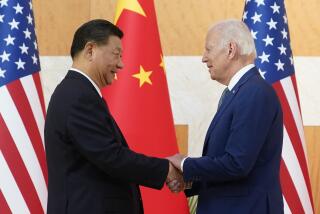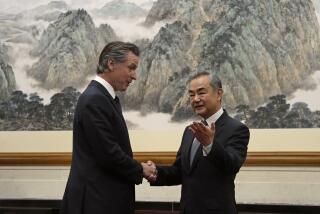Vatican, China Inch Closer to Reconciliation
- Share via
In a new sign of improving relations between the Vatican and China, Cardinal Roger M. Mahony has just returned from China, where he met with Catholic church and government officials and publicly celebrated Mass in a parish church in Shanghai.
Mahony, the Roman Catholic archbishop of Los Angeles, said this week that he was “very optimistic” that diplomatic ties between the church and Beijing would be established, opening a new chapter in a long and sometimes difficult history in church-state relations. Mahony’s low-key journey was not announced in advance because of what archdiocesan spokesman Tod Tamberg called diplomatic sensitivities. Although Mahony described the tour as a private sabbatical, he said he is preparing a report of his findings for the Vatican.
Mahony was not the only U.S. cardinal to visit China recently. Cardinal Theodore E. McCarrick of Washington paid a two-day call on Beijing in mid-October--his seventh to that country.
The trips come at a time of warming but still uneasy relations between the Chinese government and the Roman Catholic Church. In the last several weeks, the Vatican has said it would be willing to break diplomatic ties with Taiwan and recognize the government in Beijing. Rome also has spoken with unusual candor about cooperation on the appointment of Chinese bishops.
Mahony spent more than two weeks in China, including stays in Beijing, Shanghai and Hong Kong. He said he was informed that he was the first cardinal ever to publicly celebrate Mass in Shanghai, at St. Peter’s parish church. He also delivered addresses at three Chinese seminaries at the invitation of the official Chinese Catholic Patriotic Assn., a government group that keeps close tabs on the state-approved “patriotic” church.
After the Chinese revolution in 1949, the new communist government set up a parallel “patriotic” Catholic church, which answered to Beijing. The government had the last word on the appointment of bishops. Catholics who remained loyal to Rome were forced into an underground church and at times were arrested, jailed and executed. The crackdowns sometimes included members of the official “patriotic” church.
Sister Betty Ann Maheu, a Maryknoll sister writing in the latest issue of the Jesuit magazine, “America,” said 18 underground bishops are in some form of detention today.
China and the Vatican have not had diplomatic ties since 1951, two years after the Communists took power. Rome recognized the exiled Nationalist government, which established itself on the island of Taiwan. The Vatican still maintains a low-level diplomatic presence there.
Last week Cardinal Angelo Sodano, the Vatican secretary of state, said that the church would be willing to sever diplomatic ties with Taiwan, acceding to Beijing’s long-standing precondition for establishing ties with the Vatican, provided that China guarantee respect for religious freedom and fair treatment for the church.
“I am convinced the tide is moving in the right direction,” Mahony said in an interview this week at the Cathedral Conference Center in downtown Los Angeles. But he declined to speculate how soon normalization may take place. Other church leaders have offered various timetables ranging from 18 months to five years.
Kong Quan, spokesman for the Chinese Foreign Ministry, said at a news briefing last week in Beijing that his government had a “sincere wish” to improve relations. The Chinese Embassy in Washington did not return calls seeking further comment on Sino-Vatican relations.
Pope Benedict XVI has made the normalization of relations with China a priority of his pontificate. In August, Benedict welcomed “with affection” 28 priests and seminary administrators from the Chinese-government approved “patriotic” church on a trip to Rome.
There has also been movement on overcoming another formidable obstacle, the question of whether the Vatican or the government will appoint bishops in China.
The church’s tradition of popes appointing Chinese bishops is seen as interference in the internal affairs of China and the government has not recognized some of the appointees.
In the last several weeks, several bishops have confirmed that popes have quietly approved a majority of the Chinese bishops appointed in the “patriotic” church. Father Thomas Rausch, professor of theology at Loyola Marymount University in Los Angeles, said such tacit accommodations have taken place for at least five years. Others have said it has gone on much longer.
But the belated public acknowledgment by church officials was seen as an effort to advance negotiations by demonstrating cooperation. Such arrangements also give both sides wiggle room by blurring the old distinctions between the official and underground church, Catholic leaders say.
“You’ve got to keep in mind that all that distinction is just evaporating, the distinction between underground church and aboveground church. It’s blurring and disappearing,” Mahony said. “Those labels probably fit 10 years ago, but they certainly don’t fit today.”
Mahony said he found that out first-hand while visiting with Chinese Catholics. “If you talk about aboveground or underground church, they don’t know what you’re talking about. They just see the church as the church,” Mahony said.
He said he found much the same attitude among young seminarians during a question-and-answer period following one of his addresses. They asked Mahony about the funeral of Pope John Paul II and the election of Benedict.
Mahony said that the so-called official churches had portraits of Pope Benedict.
Most Chinese seminarians have previously studied in U.S. seminaries, and the rectors of Chinese seminaries have graduate degrees from U.S. and European colleges and universities, Mahony said.
Despite the progress, tensions remain. Four Chinese bishops were denied permission by the government to attend a worldwide synod, or meeting of bishops, in Rome that ended last month.
The Vatican has also continued to protest the arrest by Chinese authorities of bishops and priests loyal to Rome. Earlier this year, coverage of the funeral of Pope John Paul II by the official Chinese media was minimal. Even Internet discussions were forbidden.
But Mahony said that change will come gradually, quoting Chinese bishops as calling it “a marathon of tiny steps.”
“There can’t be a decisive moment or events and big dramatic changes like that. Things just begin to happen and slowly begin to change,” Mahony said. “There are no winners. There are no losers. Guess what? This is the way things are going now.”
More to Read
Sign up for Essential California
The most important California stories and recommendations in your inbox every morning.
You may occasionally receive promotional content from the Los Angeles Times.










